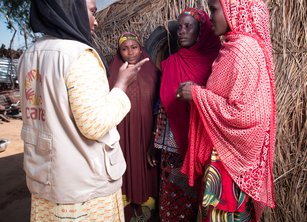-
Displacement in Syria: How CARE supports families in Qamishli, Syria, through winter
Find out how CARE is responding to the urgent needs of families displaced by the recent escalation of violence in Syria..
-
'Más amor': A Venezuelan mother rebuilds her life in Ecuador
Nany, a Venezuelan migrant living in Quito, Ecuador, now helps support other women rebuilding their lives after migration..
-
A war on women and girls: The impact of war in Sudan
The onset of war in Sudan forced Nada to flee with her five children. She now lives in a shelter-turned-classroom in Port Sudan. This is her story. Trigger warning: Contains references to sexual violence..
-
The 10 most under-reported humanitarian crises of 2025
CARE International releases its tenth edition of the world’s ten most neglected humanitarian crises..
-
Breaking down barriers in Ethiopia: How reusable period pads are changing lives
Find out about the impact of a CARE project in Ethiopia distributing over 30,000 reusable menstrual kits to women and girls..
-
The catastrophic impact of aid cuts on Sudan’s worsening crisis
Global aid cuts are having a catastrophic impact on Sudan, which remains the world’s largest crisis with millions in urgent need of humanitarian assistance..
-
Gaza: The failed promises of two ceasefires
Two months on from the ceasefire, Jolien Veldwijk, CARE Palestine (West Bank and Gaza) Country Director reflects on the continuing depth of need and scarcity of supplies in Gaza..
-
Returning amid rubble: Syria’s road to recovery
One year after the major shift in Syria’s governance landscape, humanitarian needs across the country remain critical..
-
CARE at 80: Celebrating our amazing supporters
Last Thursday we hosted a very special event at Cahoots bar, right in the heart of the Soho, to mark a major milestone: CARE International’s 80th anniversary..
-
Five key asks for climate justice at COP30
We outline CARE’s five key asks for COP30 across mitigation, adaptation, and finance -and highlight how a CARE project in Bangladesh is already leading the way in these areas..











